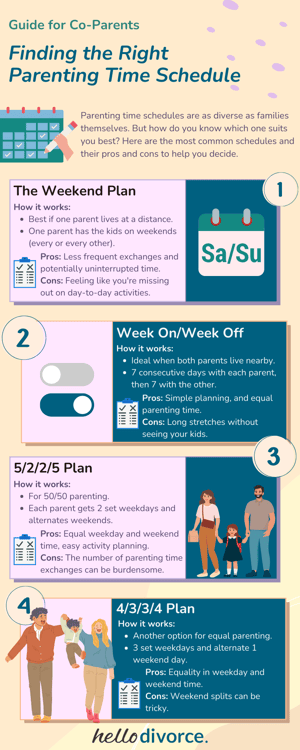Common Parenting Time Schedules: Which Plan Is Right for You?

When it comes to parenting time schedules, the options are as wide as your imagination. From a month on/month off to an every-other-weekend schedule, there are as many schedules as there are days in the year. Which one is best for you and your family?
Understanding how parenting time schedules work can help you decide which plan is best for your unique situation. Here, we break down some of the most common parenting time schedules and the pros and cons of each.
The weekend plan
This type of parenting time schedule is often referred to in movies and the media as "the weekend warrior," and more often than not, the father is depicted as the parent who only swoops in to see his children on the weekends. While movies like to over-dramatize these situations, this parenting time schedule is actually quite common.
How it works: This schedule is commonly chosen when one parent lives in a different town or an extended distance from the children's "home base." That parent exercises their parenting time on the weekends, usually from Friday evening to Sunday evening.
This plan works for every weekend, every other weekend, or a combination of a few weekends per month.
Pros: If one parent lives a town or two away, this plan eliminates some drive time in comparison to a plan with more frequent parenting time exchanges. While the parent who has the weekend parenting time has fewer overnights with the children, all of their parenting time should be presumably unfettered by work or school obligations.
Cons: With this plan, it's easy for each parent to feel like they are missing out on time with their children: the parent who has weekend time can feel like they are missing out on the day-to-day raising of their children (after school, homework, weekday dinners, etc.), while the parent who has the weekday parenting time may feel that they miss out on the fun weekend time with the children – particularly with school-aged children.
Related: What's the Difference Between Legal and Physical Custody?
Week on/week off
Another common parenting time schedule is the week on/week off plan, wherein one parent has the children for seven (7) consecutive days, and the other parent has the children for another seven (7) consecutive days.
How it works: Generally, this type of plan works best when both parents live fairly close to each other and the children's school(s) and activities are centralized. Exchanges can occur on Friday evenings after school to begin the weekend or on Monday mornings at school. However, the options are endless as to the best time to exchange the children depending on what is most beneficial for your family.
Pros: This plan is one of the easiest to plan for – both for the children and parents – as there are limited parenting time exchanges and few variations to the schedule. This is also a truly equal parenting time schedule with each parent having 50% of the time with the children.
Cons: For parents, it can be hard not to see their children for seven (7) consecutive days, particularly when the children are quite young. Likewise, it can be stressful for children not to see a parent for a full week. Video calls can help alleviate this, though.
5/2/2/5
When parents seek a 50/50 parenting time schedule, they often decide upon a 5/2/2/5 plan which allows for equal parenting time without prolonged time away from the children.
How it works: The most common 5/2/2/5 plan is a schedule where, over the course of two weeks, each parent has two weekdays per week where they always have parenting time and an alternating of the weekends. This results in a plan where, during a two-week period, each parent will have a five-day block and two two-day blocks of parenting time. For instance, Parent A has parenting time every Monday and Tuesday; Parent B has parenting time every Wednesday and Thursday; and weekends alternate every other week. Visually depicted, a two-week schedule could look like this:
| Mon. | Tues. | Weds. | Thurs. | Fri. | Sat. | Sun. | |
| Week 1 | Parent A | Parent A | Parent B | Parent B | Parent A | Parent A | Parent A |
| Week 2 | Parent A | Parent A | Parent B | Parent B | Parent B | Parent B | Parent B |
Pros: This is a truly equal parenting time schedule that allows each parent to enjoy parenting time during the week as well as parenting time on the weekends. Having "set" parenting time days during the week also allows for easy planning of activities.
Cons: If the parents do not live near each other, the number of parenting time exchanges can be burdensome. It can be a difficult schedule to grasp at first and may not translate well to older children (teenagers) who start having their own work and social schedules.
4/3/3/4
Much like the 5/2/2/5 plan, this type of schedule provides for equal parenting time without prolonged time away from the children.
How it works: The most common 4/3/3/4 plan is a schedule where, over the course of two weeks, each parent has three weekdays per week where they always have parenting time, and they alternate one weekend day. This results in a plan where, during a two-week period, each parent will have a four-day block and two three-day blocks of parenting time. For instance, Parent A has parenting time every Sunday, Monday, and Tuesday; Parent B has parenting time every Wednesday, Thursday, and Friday; and Saturday is alternated every other week.
Visually depicted, a two-week schedule could look like this:
| Mon. | Tues. | Weds. | Thurs. | Fri. | Sat. | Sun. | |
| Week 1 | Parent A | Parent A | Parent B | Parent B | Parent B | Parent A | Parent A |
| Week 2 | Parent A | Parent A | Parent B | Parent B | Parent B | Parent B | Parent A |
Pros: Similar to the 5/2/2/5 plan, this is a truly equal parenting time schedule that allows each parent to enjoy parenting time during the week as well as parenting time on the weekends. Having set parenting time days during the week also allows for easy planning of activities.
Cons: If the parents do not live near each other, the number of parenting time exchanges can be burdensome. It can also be difficult to split the weekends up. However, the days can be adjusted to fit the needs of the family. As with the 5/2/2/5 schedule, this plan may not translate well to older children (teenagers) who start having their own work and social schedules.
The plans detailed above represent just a few different types of schedules. Many factors can contribute to a parenting schedule. School schedules, work schedules, the age of your children, and where you live in relation to your ex are just a few examples of things to consider. Just know that when you are deciding on which parenting time schedule works best for your family, there is no right or wrong answer.
.png)
Need a little more help with co-parenting?
Our free download can help.



